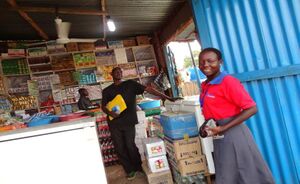
Biodiversity[edit | edit source]
In 2006, President Kiir announced that his government would do everything possible to protect and propagate South Sudanese fauna and flora, and seek to reduce the effects of wildfires, waste dumping, and water pollution. The environment is threatened by the development of the economy and infrastructure.
Ecoregions[edit | edit source]
Several ecoregions extend across South Sudan: the East Sudanian savanna, Northern Congolian forest–savanna mosaic, Saharan flooded grasslands (Sudd), Sahelian Acacia savanna, East African montane forests, and the Northern Acacia–Commiphora bushlands and thickets. W
Trees, woodland and forest[edit | edit source]
The country had a 2019 Forest Landscape Integrity Index mean score of 9.45/10, ranking it 4th globally out of 172 countries. W
Water supply[edit | edit source]
Water supply in Southern Sudan is faced with numerous challenges. Although the White Nile runs through the country, water is scarce during the dry season in areas that are not located on the river.
About half the population does not have access to an improved water source, defined as a protected well, standpipe or a handpump within 1 km. The few existing piped water supply systems are often not well maintained and the water they provide is often not safe to drink.
Displaced people returning home put a huge strain on infrastructure, and the government institutions in charge of the sector are weak. Substantial external funding from numerous government agencies and non-governmental organizations is available to improve water supply.
Water is Basic[edit | edit source]
Water is Basic is a non-profit NGO that drills clean water wells in South Sudan. The organization was founded in 2006 during a meeting of Sudanese church leaders, who decided that the local church's first steps after the signing of the Comprehensive Peace Agreement ought to be fulfilling physical needs. It is believed that between 50% and 60% of South Sudan's population has access to a better water source, such as a hand pump, a protected well, or - for a tiny minority - a piped water system
Water is Basic is the largest clean water non-profit organization in South Sudan.
Water is Basic completed its first well on June 28, 2008 and has since completed over 500 boreholes and repaired 75 others to working condition throughout states of Central and Western Equatoria and Jonglei. Water is Basic was led by Bishop Elias Taban, founder of the Sudan Evangelical Presbyterian Church and recipient of the 2013 Clinton Global Citizen Award by the Clinton Foundation. The US branch of the charity is led by Steve Roese.
On March 10, 2014, Water is Basic and the Permanent Mission of South Sudan to the United Nations hosted an event, titled "Women and Water in South Sudan," as a contribution to the 58th United Nations Commission on the Status of Women. In August 2014, Water is Basic leaders joined 91 other individuals and organizations - including former US government officials, members of the UK Parliament, and leaders of advocacy and humanitarian organizations - to sign a letter sent to South Sudan's President Salva Kiir and former Vice President Dr. Riek Machar urging an end to the brutality between the government and opposition leaders.
On June 4, 2017, the armed conflict in Yei River State officially ended; the charity was then able to continue their work at Abegi. The charity went on to help the community in the teaching of police officers.
NGO support[edit | edit source]
Numerous non-governmental organizations support water supply in Southern Sudan, such as the Obakki Foundation from North America, Caritas, GOAL from Ireland, Concern Worldwide from Ireland, the International Rescue Committee, Medair, Oxfam and Save the Children UK, and the locally led Water is Basic. Many of these groups finance their work through donations, but also through official development aid, such as the Basic Services Fund. W
News and comment[edit | edit source]
2014
2009
Clean-Up initiative in Southern Sudan,[1] October 15
About South Sudan[edit | edit source]
South Sudan (), officially the Republic of South Sudan, is a landlocked country in East Africa. It is bordered on the north by Sudan; on the east by Ethiopia; on the south by the Democratic Republic of the Congo, Uganda and Kenya; and on the west by Central African Republic. South Sudan's diverse landscape includes vast plains and plateaus, dry and tropical savannahs, inland floodplains, and forested mountains. The Nile River system is the defining physical feature of the country, running south to north across its center, which is dominated by a large swamp known as the Sudd. South Sudan has a population of 12.7 million. Juba is the capital and largest city.
Sudan was occupied by Egypt under the Muhammad Ali dynasty and governed as an Anglo-Egyptian condominium until Sudanese independence in 1956. Following the First Sudanese Civil War, the Southern Sudan Autonomous Region was formed in 1972 and lasted until 1983. A second Sudanese civil war soon broke out in 1983 and ended in 2005 with the Comprehensive Peace Agreement. Later that year, southern autonomy was restored when an Autonomous Government of Southern Sudan was formed. South Sudan became an independent state on 9 July 2011, following 98.8% support for independence in a January 2011 referendum. It is the most recent sovereign state with widespread recognition as of 2024.